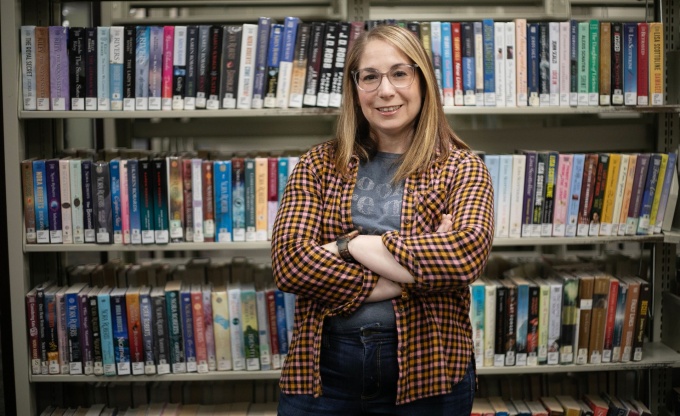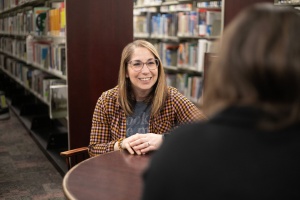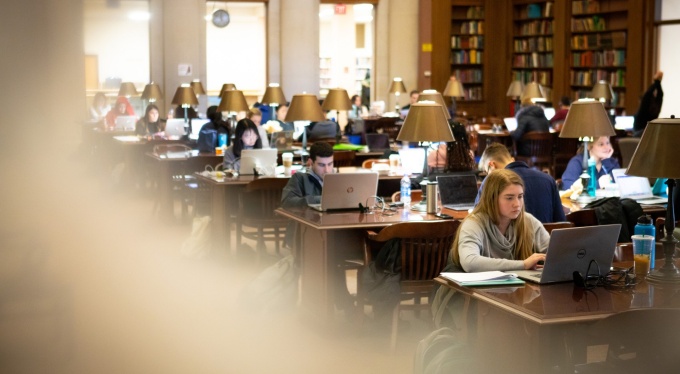Check it out: Library social work

Leah Topek-Walker, LCSW-R, DSW ’25, at Patchogue-Medford Library. Photo: Brenda Percy
Interview conducted and edited by Jana Eisenberg
Leah Topek-Walker, LCSW-R, DSW ’25, describes herself as a “social work educator and innovator particularly interested in library social work, antiracism and supporting communities.”
Topek-Walker is a clinical associate professor and practicum education coordinator at Stony Brook University School of Social Welfare on Long Island and will soon complete her Doctor of Social Work (DSW) from University at Buffalo School of Social Work.
After working in community mental health early on, she became aware of (and fascinated by) the intersection of libraries and social work. It was a fortuitous time to enter the field, as awareness of the potential for library social work was growing nationally. Once local libraries began experiencing the results, they clamored for their own social workers. She and an additional supervisor now run a program for almost 20 student interns per year.
What is a library social worker?
Library social workers are placed within libraries; the model works with both the individual and the community. Libraries are fundamentally about judgment-free spaces where people can get what they need, where they feel safe and can have access. So library social work ties into the social work principles of trauma-informed care and anti-oppressive practices.
How are libraries and social work compatible?
Libraries are amazing community hubs, offering so much for so many people — folks who may be living outside, families, seniors, people who are undocumented, working people whose kids need a place to go after school. When things are going well, libraries are places where people co-exist. Our culture doesn’t have many spaces like that.
Now more than ever, libraries provide critical spaces that our communities need. Library social workers are the links that connect people to vital resources and basic human rights.

Topek-Walker meets with a community member. Photo: Brenda Percy
What do library social workers do?
Every library and library system is different. One aspect of the job is talking with librarians — about how the library is accessible and how their policies might impact their communities.
Library social workers also connect with community agencies, food pantries and other players. In our current context, people are experiencing fragmentation and chaos within our government and social service systems. Library social workers can provide lifesaving and life-changing information, such as connecting people to housing and health insurance so they can access care.
What makes library social work different?
Library social work doesn’t use a “medical model.” We don’t do long intakes or ask people for insurance information. They can say, “I don’t want to tell you my name, but I would like help with X and Y.” And the library social worker says, “Great, let’s do it.” It’s a very different way of providing services — social work students and library social workers see themselves as collaborators. We’re here to link people with services and resources and help them navigate systems however we can.
Another difference is that, in library social work, often you’re the only social work voice. You not only represent yourself and the people you’re serving, but also our entire profession. We have to be comfortable with that.
What do you find appealing about it?
Part of the social work code of ethics is treating people with dignity. Most people we work with, especially folks who are unsheltered, are never treated with dignity. We have many moments where someone meets with a library social worker, even just to check in, and afterwards, they feel that they were treated well. They can trust that this individual — who represents our profession — believes in them and treats them like a human being.

Students study in Abbott Library on UB South Campus. Photo: Douglas Levere.
What is the career path to library social work?
Every library system is totally different, which can make it confusing. Some library systems hire staff social workers; they can be employed through the county, town, city or whatever system “holds” all the library employees. On Long Island, the libraries are their own entities, and they all go through civil service. The New York City Public Library System has a social worker. Then there are nonprofits that send out some of their caseworkers to libraries.
Are your DSW studies at UB affecting your current work?
Yes. When I went back to school and began formally learning implementation science, I gained perspective on implementing programs in general and this program specifically. With the program, we’ve both firmed things up, and we can also say, “OK, I know how to make this better.”
How do you see the future of library social work?
Librarians are on the front lines of many of our crises. It’s exciting for social work to be part of the conversation about how we’re both taking care of these spaces and the people who work in them. Having support and working to bring our professions together is really powerful. Library social work is transformative.
Published March 24, 2025
